
Things you need to know about Halal certifications and logos; Philippines
Halal certifications and halal logos is ever more important consideration of consumers. With the rapid Muslim population growth in Asia, the Halal logo is becoming an increasingly valued symbol of authenticity for food items in the food industry.
Knowing how to identify if your halal certification is genuine or not can save you from unknowingly buying haram contaminated goods.

Hey, Filipino Muslim friends, are you being careful about what you eat?
What about the food you buy in supermarkets? Are you sure it is Halal?
Do you get confused by the many different Halal certification logos?
Is it difficult to tell which halal certification logo is genuine?
I know the feeling. Don’t worry, I wrote this article just for you.
As fake news is everywhere! Whether it’s on the internet, on social media, or even word of mouth from your friends, News about foods you eat is very alarming.
Claims that certain halal meat products are actually haram with YouTube video clips to back them up, especially those canned goods; tuna, corned beef, and meat products in supermarkets.
Or perhaps they are not just baseless rumors after all.
In any case, let’s check it out and dive in deeper. Let’s start with the facts.
❗ Bismillah, For this article, below I’ve provided links to important content and facts from their correlating reference websites and I personally contacted the certifying bodies to ensure accuracy, but so far very few have responded. What’s in this article is a curation of general information that can be found on the internet. Please review our Disclaimer, All praise is to Allah and Allah knows best.
Halal Certification Meaning
The word ‘Halal’ حلال describes permissible things in Islam, stating that it is permissible to consume, earn money from, buy & sell, give away, marry people under the Halal wedding contract and so much more. But who decides what’s halal and what’s not?
Halal حلال label is usually found on the packaging of some food products and on some signs in restaurants and shops. These have become a sign that the product conforms to Islamic dietary requirements, Islamic lifestyle, and top quality, cleanliness, and health standards.
Halal Certificate is a document that certifies that products and services aimed at the Muslim population comply with Islamic law and therefore are suitable for Muslim consumption.
Halal certification is a process that ensures the features and quality of the products in accordance with the rules established by Islamic Law.
When a product is Halal-certified, it will usually be marked with a Halal حلال symbol.
Did you know there is One Official National Halal Logo in the Philippines

On March 19, 2019, In its ninth meeting, the board, composed of nine government agencies led by the Department of Trade and Industry (DTI), the Philippine Halal Export Development and Promotion Board (PHEDPB), led by Trade Secretary Ramon M. Lopez, approved the design and guidelines for the Philippine Halal Logo.
The national Halal logo to identify halal-certified products produced in the Philippines have two versions available: one that is monochrome for labeling purposes as a means to reduce printing costs and another in full color for other printing materials. Furthermore, halal-certification bodies have their own halal logos, which are still allowed to be used despite the adoption of the 2019 Philippine national logo.
Did you know there is more than one halal certifier in the country?
It might surprise you to learn that there are currently a number of private halal certification firms in the Philippines, each using a different halal certification logo.
Philippine Halal certifiers gain accreditation and are recognized under Philippine Government RA No. 10817. Through them, you can apply for halal certification in the Philippines.
Please note that because they must renew each year, some of these organizations may have changed or not renewed at all.
- Islamic Da’wah Council of the Philippines – (IDCP) was formed way back in 1981 and it complies with GSO 2055-2 and the demands of the Emirates Authority for Standards and Metrology (ESMA), IDCP has developed a Quality Management System that is in line with ISO/IEC 17065:2012. IDCP is fully committed to the efficient application of these Standards. It is set up and organized in a way that protects objectivity.
- Halal Development Institute of the Philippines – is a non-Profit Islamic Religious Organization established in 2008 in Davao City, to promote the Philippine Halal Product.
- Mindanao Halal Authority – (MINHA) is a non-stock, non-profit organization registered with the Securities and Exchange Commission (SEC) as well as a Halal Certifying Body by the National Commission on Muslim Filipinos (NCMF). They are a non-profit organization that specializes in Halal classification and certification. as posted on their Facebook Page
- Halal International Chamber of Commerce and Industries of the Philippines – It was established in 2013, The HICCIP is a Halal certifying body, Partners and recognized by a different groups local and foreign Halal / Business organizations, (Gov’t. or NGO), Member of the International Halal Authority Board (IHAB) and PCCI,
- Prime Asia Pacific – This company is part of the Prime Group of Companies, based in the United Arab Emirates, and the only halal-certifying body in the Philippines recognized by the Saudi Food and Drug Authority (SFDA) and authorized to certify food exports to the Kingdom of Saudi Arabia as according to Manila times article dated April 19, 2021.
- Philippine Ulama Congress Organization Inc. – As a Halal-certifying body, PUCOI endeavors to promote and advance a halal industry in the Philippines that is impressed with integrity and credibility
- Muslim Mindanao Halal Certification Board, Inc.
- Alliance for Halal Integrity in the Philippines Inc
- Khayra Ummah Foundation Inc.
- Ulama League of the Philippines
- Islamic Advocate on Halal and Development
Some of these Halal certifiers are also recognized in nearby Southern Asian countries such as Malaysia, Indonesia, Singapore, Japan, Thailand, and even in China, Europe, and the United States. Some of these bodies are also proud members of the World Halal Food Council (WHFC).
The Philippines has several Halal certification bodies but some of which have been inactive for some time. Check out their websites for more information.
Law that governs the Halal Development in the Philippines?
RA No. 10817 describe the halal industry in the Philippines and all about The Philippine Halal Export Development and Promotion Program.
This list from DTI of halal certifiers in the Philippines may have some new additions that I have not included due to a lack of information.
Authentic Halal Certifications and Logos
You may be wondering how many Philippines logos still exist due to different halal logos on food items in the market today.
Here are some of the halal-certified logos in the Philippines and If you are wondering about the meaning of Halal and Haram read the article What is halal.
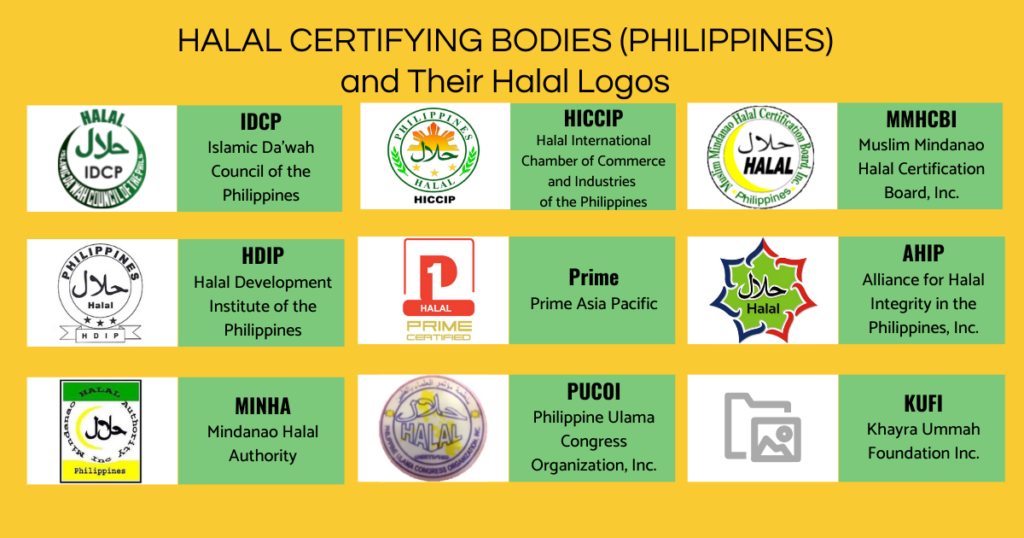
Going for halal certification is a lengthy and costly process, needs to be renewed every year, and there are processes like halal auditing and monitoring of the products in its factories. As a result, many halal labels in the market are fake and it’s hard to tell if the certification is genuine.
List of approved foreign halal certification bodies by Majelis Ulama Indonesia and foreign halal certification bodies by JAKIM Malaysia
Are there fake halal logos?
A fake Halal logo is just a printout logo without proper certification from the HCB board, which does not meet the requirements to be considered Halal.

In fact, faking Halal logos does not just occur in the Philippines, it occurs internationally.
Halal Logos and Halal Certificates must have undergone a strict process in accordance with Shariah or Islamic law to guarantee that the product is healthy and pure.
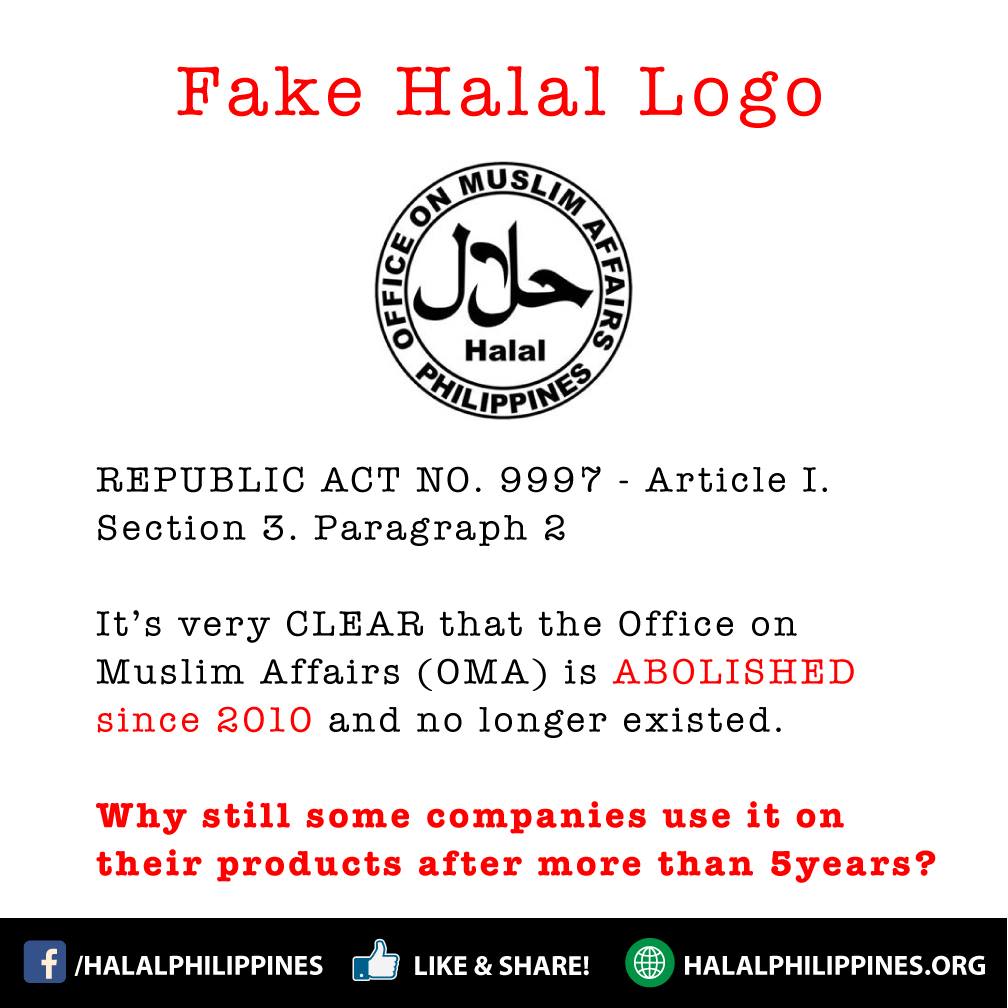
This is considered a fake Halal logo since its old and the Office of Muslim Affairs (OMA) has no longer existed since 2010 and according to authorities they are not authorized to certify products or services as Halal or not.
A new halal logo is already available on the market, meaning this unofficial halal logo with an OMA symbol should not be used as a halal seal. So why does it still appear on some food items today?
A fake halal logo can also be a halal-certified logo that has expired or one that has been placed inappropriately on food products. Cases such as these include:
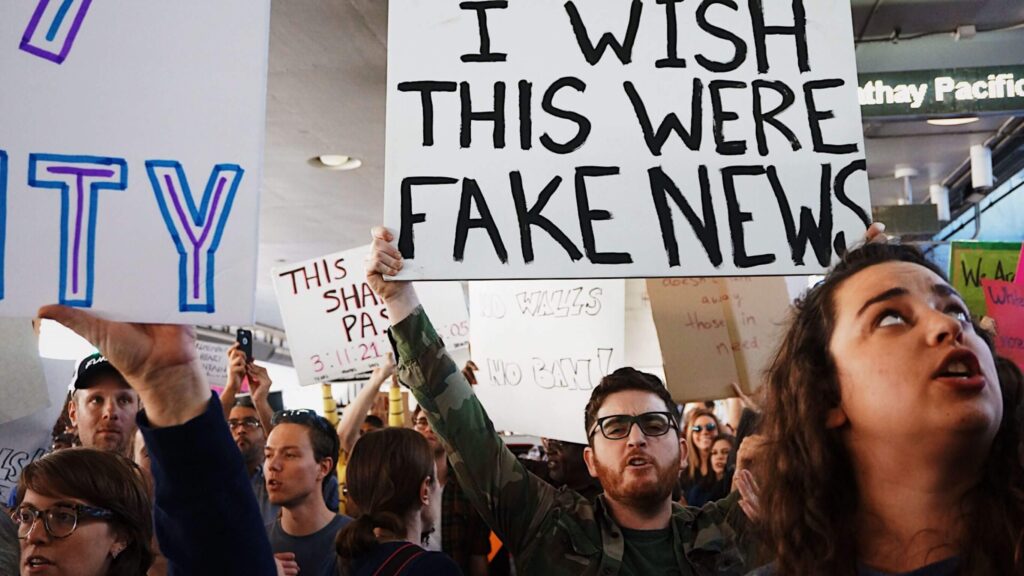
Long story short, remember a few years back? There was a complaint about imported Pork Noodles with the Halal Logo in them, and it was reported to the concerned agency, and they deemed it as “MISLABELING” and no further action was required. Yeah right!
And earlier this year, MUSLIM consumers in Metro Manila and elsewhere in the country are being warned of fake ‘halal’ food. “Beware [of] Pork Leg,” which The Manila Times discovered was about imported meat products packed by BW Foods Ltd./Meat Embassy from Lagos, Nigeria. here’s the article from Manila Times.
How about when DOST Labs find PORK in Halal products towards the end of 2019? Several brands of beef patties and chicken hotdogs were also found to contain pork, as well as halal canned beef. the DOST Halal S&T Program laboratories examined and analyzed only Halal-certified products.
The “confidentiality agreement” protected the manufacturer from being disclosed regarding the pork contamination of the food product. Leaving Filipino Muslims unaware of everything, and perhaps even purchasing that same contaminated items during the lock down. Wa nauzubillah!
Obviously, some food manufacturers are cutting costs because pork is cheaper than beef. But can we really rely on the system of so-called Halal-certifying bodies?
As Muslims in a Catholic nation like the Philippines, we should be wary of things like this, and it’s always a good idea to check the ingredients list. Just be vigilant!
Application For Halal Certifications Philippines

According to DTI, requirements vary on the nature of the product, process, or service. Halal Certification Bodies will provide the requirements according to the size of the company and the nature of the product/process/service.
Go to their website or Facebook page which I linked to their names above, contact them, request a form (or you can download it from their webpage), and here are some of the halal certification requirements Philippines you might need to answer/provide
- Details of Applicant
- Details of Authorized Representative
- Details of site(s)/locations
- Previous /Current Halal Certifications
- Scope of Certification being applied for
- Slaughtering Details
- Product Details/Slaughterhouse
- Feed Statement/Declaration
- Ethanol
- Market Place
- Product Details/Further Processing
- Packaging Materials Table | List only the packaging material that will have direct contact with the halal product.
- Halal Standard Operating Procedure
The benefit of products with Halal Certifications

Halal products are becoming increasingly common in business today. Halal products can trigger growth in the economic sectors of a country.
Halal products are now part of trade at regional and international levels, according to Halal Certifying Bodies. Therefore, every country must have a standard concept of halal products that are recognized by other countries around the world.
- Assurance of quality, hygiene, and safety compliance.
- Required for Muslims, preferred for non-muslims.
- Established and recognized internationally.
- Worldwide demand of 1.7 billion consumers and growing.
- Boost sales to enter a 3 trillion dollar global market.
- Ability to enter countries with mandatory Halal requirements.
- Ability to remove non-tariff barriers.
- Unique selling proposition to attract Halal consumers.
- Fulfilling your responsibility to supply authentic Halal.
- Increases the value of your products.
- Provides consumers with confidence in your products.
- Provides benefits in this world as well as in the hereafter.
Common Tips You Need To Remember

- Always read the food labels when purchasing food, as ingredients can change without notice.
- Look for Halal certifications and symbols, Halal ingredients labels, or Halal store signage.
- Get Halal meat or poultry from a Muslim butcher or a shop that only sells Halal products.
- Buying meat, beef, and poultry from sellers who also sell pork products is a bad idea.
- Some margarine contains monoglycerides and diglycerides from animal sources.
- When uncertain about the food or restaurant, order vegetarian or plant-based foods.
- Asking the chef or cook whether their food contains pork and alcohol is a tradition.
- There is no guarantee that vegan food is halal because it may still contain alcohol.
- Soup stock made of bones is likely to have pork ingredients in them.
- If possible, avoid food chains that serve pork and its by-products.
- Avoid haram food by bringing your own prepared lunch.
- Always look for the Halal حلال symbol
- And ask for Halal حلال
Conclusion
Halal is a way of life. It means pure, healthy, and safe. Muslim consumers should be able to identify halal products in the market.
By spreading awareness and knowledge among Muslim consumers about authentic and fake halal logos, it may be possible to reduce the possibility of purchasing fraudulent and haram-contaminated products.
Governments should also take action against food producers who violate the law. Regular and effective monitoring by the relevant agencies could help to deal with this persistent problem.
It’s such a shame that we cannot get a full list of halal certified products in the Philippines but maybe in the near future, some companies may develop an app that identifies halal goods and halal certified companies to make our life easier.
There is no way to list all the possible foods that may contain Haram ingredients. Please read labels carefully and regularly.
Learn more about halal through our recipes and halal articles. Photos in this blog were created and edit using Canva.
Jazakallahu Khair, Thanks for reading, and do let me know what you think below!
Reference resources
Department of Trade and Industry, DTI-EMB-HALAL-Brochure-min.pdf, PH+Halal+Certification+Bodies.pdf
Majelis Ulama Indonesia, foreign halal certification bodies, JABATAN KEMAJUAN ISLAM MALAYSIA foreign halal certification bodies, International Journal of Academic Research in Business and Social Sciences Vol. 9 , No. 9, September 2019, E-ISSN: 2222-6990 © 2019 HRMARS



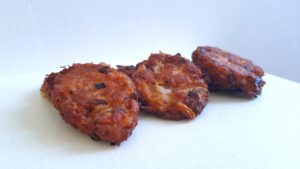
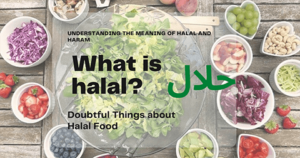
14 Responses
Wow, thank you dito, ngayon alam ko na. very helpful acticle.
Thanks for reading, glad you liked it.
Dami pala ng halal logo sa Pinas? It is a wise idea talaga to check the ingredients kapag bibili tayo. Buti nlang I stop buying cornedbeef. Haram pla mga yon Allahu Akbar.
Hi Linlin,
Thanks for reading, glad you liked it.
Hindi po lahat haram yung mga canned kinds of beef and meat kapag my certification na halal, few cases happen on manufacturer’s side siguro pero hindi po lahat. Let’s just make it a habit to be very careful when it comes to buying meat products.
Good day, and stay safe.
is this reliable? did you get it from credible sources?
Hey Ahmad, If you are referring to this article, then yes, it is a piece of general information. If you are referring to the articles for the haram-contaminated products, then please visit the links for each site. Thanks for reading.
Salam Ms. Salymah, Ramadan Kareem and Mubarak to you and your family. This is great work since we lack general and detailed information on Halal Certification here in the PH. I hope you can post more Halal content in the future.
However, may I know the reference of IDCP being recognized by ESMA because I have checked the website of ESMA (now known as MoIAT), and IDCP was not on the list (https://moiatcabs.moiat.gov.ae/en-us/OpenData/Pages/Accredited-CABS.aspx)
I will be looking forward to more Halal and Halal certification-related content.
Jazak Allah Khairan.
Wa Alaikum salaam, Thank you for reading; we will look into the details and make any necessary changes.
I was wondering why there are so many different Halal logos here in the Philippines. I am grateful I came across your blog. appreciate the effort. This is a very helpful blog. Keep posting them at Salamat sa info.
Good article!
Very well explained the topic, I am wondering if you had explored more on point no 5, it wud be more helpful . Anyways I am loving your blog.
Planning to do my thesis regarding Halal Logos. Hope you will be one of my respondents. Allahumma Aamen
How about po sa mga may label na certified halal pero wala namang logo?
Hello Charity,
I would like to understand your point better. Could you provide more details or explanations?
From my perspective, having a certified halal logo plays a crucial role in establishing trust between products and consumers. When a product claims to be halal certified but lacks a recognizable logo, it’s essential for us, as consumers, to be cautious and opt for products that display trustworthy halal symbols/Logo from recognized certification authorities.
Thank you for taking the time to read this.